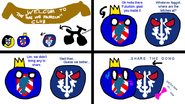 |
Work in Progress "Workers of the world, unite! Separately, in your own homes.!" - Asocialism Jaoo is currently working on this page. Please do not intervene with their work. Instead, contact them to propose additional edits. |
Futurism was an Italian artistic philosophical movement based on a ![]() Ultra-Modernist spirit based on beauty an action. It believes beauty is found in the new, speed and dynamic culture; said culture is achieved in rebellion and action against the past, and following that logic all futurists sought to understand the means to find that beauty.
Ultra-Modernist spirit based on beauty an action. It believes beauty is found in the new, speed and dynamic culture; said culture is achieved in rebellion and action against the past, and following that logic all futurists sought to understand the means to find that beauty.
Futurism thus believes in revolutionary thought in beauty, promoting violence, the abolition of past traditions, hyper-industrialism and the whole of human passion and emotion. It rejects any form of utilitarianism, moralism or conservatism; choosing instead to lean on individualism and similar conclusions.
In its search for action, futurists have supported a range of political movements in the past, from ![]() fascists, to
fascists, to ![]() socialists, to even File:Ego.png anarchists. However many of its involved politicians and philosophers, specially its founder, F. T. Marinetti, have lead or developed their own political movements.
socialists, to even File:Ego.png anarchists. However many of its involved politicians and philosophers, specially its founder, F. T. Marinetti, have lead or developed their own political movements.
History
Futurism began as an Avant-Garde movement on February 5th, 1909 in Italy when Filippo Tommaso Emilio Marinetti published "The Manifesto of Futurism" in the magazine La Gazzetta dell'Emilia, later republished in the French newspaper Le Figaro. Futurism was characterized by a fetishization of everything new: industry, technology, automobiles, planes, youth, speed, and violence; and conversely, a rejection of anything seen as old. Futurism often had nothing in the way of limits, seeking to offend more than to please, futurist plays would often involve their audience in non-consenting ways like gluing their clothes to their seats.
Early exponents of Futurism were involved in many movements of nationalist character, ![]() Marinetti specially would actively support Italian nationalism and Italian entry to the war. Besides his eccentricities, most early Futurists would be interventionist, many such as Luigi Russolo, Umberto Boccioni, Carlo Carrà and Marinetti himself would fight for Italy. The biggest exception would be Gino Severini and Giacomo Balla, both who would support fascism in some way later in their lives.
Marinetti specially would actively support Italian nationalism and Italian entry to the war. Besides his eccentricities, most early Futurists would be interventionist, many such as Luigi Russolo, Umberto Boccioni, Carlo Carrà and Marinetti himself would fight for Italy. The biggest exception would be Gino Severini and Giacomo Balla, both who would support fascism in some way later in their lives.
In 1918, Marinetti, together with Emilio Settimelli and Mario Carli founded the Futurist Political Party, the party was designed to be what Marinetti called a "compact fusion of an artistic, political and military engagement." This militarism and already existent nationalistic sentiment would lead the party to ally and organize with Benito Mussolini's Fasci Italiani di Combattimento and Arditi movements, believing them to be representative of a progressive generation of Italian nationalism.
The party would expose wildly varying ideas, from staunch secularism, to georgist economics, to adhocratic bureaucracy, and a great nationalistic sentiment, demanding for military presence until the end of the Austro-Hungarian empire and a dogmatic souverainism. Carli would also form his own Arditi journal, exploring the philosophy in what many call Arditism; this would show strong resemblances to the Futurist program, leading to close cooperation between both circles in what developed Ardito-Futurism.
Even though the movement was nominally anti-Socialist, it actively sought for left-wing members in anarchist, left-syndicalist and communists. Instead their anti-Socialism came from opposing the Italian Socialist Party, which was believed to be cowardous and representative of conservative institutions, as opposed to the Bolsheviks and Communists alike, who had aesthetic and revolutionary fervor
Compared to the Arditi, Futurist relations with Mussolini were far less friendly. Marinetti and Mussolini would become personally close meeting frequently during the whole of 1919. From their earliest meetings in late 1918, Marinetti would show skepticism towards Mussolini, in what he saw a "Napoleonic elitism," although never public, these feelings would be essential for their later relationship.
Similarly Mussolini was also skeptic towards Arditi socialist-like ideals of revolution, something that would conflict with Fascist class collaborationist theory. However, either due to opportunism or genuine revolutionary ideals, Mussolini would still ally deeply with the Futurists. As Marinetti saw him as a "man of steel and the future," he sought to keep up that rhetoric in his speech and figure.
 Fiume enterprise
Fiume enterprise 
Personality and Behaviour
Futurism is often written as a manic artist who is obsessed with things that are new and go fast. If he is angered (which is very easy to do), he will immediately resort to violence.
Stylistic Notes
Futurist is constantly obsessed with speed. This can result in him suddenly yelling in all-caps, all bolded or even having his words run into each other with no spaces.
How to Draw
Futurist Political Party Design
- Draw a ball
- Fill the space below with Navy Blue.
- Draw a white sword and laurel wreath
- Draw the eyes and you're done!
| Color Name | HEX | RGB | |
|---|---|---|---|
| Navy Blue | #000040 | 0, 0, 64 | |
| White | #FFFFFF | 255, 255, 255 | |
Relationships
Friends
 Leninism - Thanks for supporting my state!
Leninism - Thanks for supporting my state! Homonationalism - Hey there, sexy ~.
Homonationalism - Hey there, sexy ~. Fascism - Modernism as seen through nationalism, make Italy sovereign!
Fascism - Modernism as seen through nationalism, make Italy sovereign! Socialism - Modernism as seen through internationalism, stand on the solid rock of "we"!
Socialism - Modernism as seen through internationalism, stand on the solid rock of "we"! Industrialism - Sing the man at the wheel, the factory will overtake him!
Industrialism - Sing the man at the wheel, the factory will overtake him! Social Darwinism - Art is to become a slap in the face of sloth!
Social Darwinism - Art is to become a slap in the face of sloth! Anti-Realism - This "realicide" of yours sounds neat! Down with realism!
Anti-Realism - This "realicide" of yours sounds neat! Down with realism! Georgism - Nationalize the land for the people!
Georgism - Nationalize the land for the people! Republicanism - Abolition of the ceremonial patriotism!
Republicanism - Abolition of the ceremonial patriotism! National Bolshevism - Glad to see Limonov reintroducing futurism for the new generation
National Bolshevism - Glad to see Limonov reintroducing futurism for the new generation
Frenemies
 Jihadism - Down with the old pagan gods!
Jihadism - Down with the old pagan gods!  National Transhumanism - I like your robot arms but what's with this race war bullshit?
National Transhumanism - I like your robot arms but what's with this race war bullshit? National Socialism - I like your nationalism, but stop LARPing with the Teutonic Prussian shit lol.
National Socialism - I like your nationalism, but stop LARPing with the Teutonic Prussian shit lol. Technoprimitivism - I like your love of technology but why do you care so much about MONKEYS of all things?
Technoprimitivism - I like your love of technology but why do you care so much about MONKEYS of all things? Cosmicism - I like the fact you're looking at the future but why do you have to be so depressing?
Cosmicism - I like the fact you're looking at the future but why do you have to be so depressing? Socialist Transhumanism - While I appreciate your love of technology, I refuse to be around a leftie.
Socialist Transhumanism - While I appreciate your love of technology, I refuse to be around a leftie. Revolutionary Progressivism - Extreme violence? AWESOME! Culturally far-left? Splendid! WHY IN THE HECK are you so anti-fascism?! Don't you see that strongman fascist leaders could help us achieve our end goals? SMH...
Revolutionary Progressivism - Extreme violence? AWESOME! Culturally far-left? Splendid! WHY IN THE HECK are you so anti-fascism?! Don't you see that strongman fascist leaders could help us achieve our end goals? SMH... Reactionary Modernism - You like tech and hate mainstream progressives? Based, but get more violent and embrace homosexuality!
Reactionary Modernism - You like tech and hate mainstream progressives? Based, but get more violent and embrace homosexuality! National Feminism - Feminism is opportunistic cowardice, but we do have female Futurists, as Valentine de Saint-Point, Natalia Goncharova, Aleksandra Ekster, and Lyubov Popova have good views and propagate my views.
National Feminism - Feminism is opportunistic cowardice, but we do have female Futurists, as Valentine de Saint-Point, Natalia Goncharova, Aleksandra Ekster, and Lyubov Popova have good views and propagate my views. Utilitarian Ethnonationalism - Very based Ethnonationalism here, BUT YOU RUINED IT WITH UTILITARIANISM!!
Utilitarian Ethnonationalism - Very based Ethnonationalism here, BUT YOU RUINED IT WITH UTILITARIANISM!! Libertarian Transhumanism - Cool, but why libertarianism?
Libertarian Transhumanism - Cool, but why libertarianism? Technocracy - Ooh, new and exciting! Would you consider a country run by artists? But also, a state ran by intellectuals who prioritize rationality sounds cringe.
Technocracy - Ooh, new and exciting! Would you consider a country run by artists? But also, a state ran by intellectuals who prioritize rationality sounds cringe. Anarcho-Nihilism - Doesn't care about future and progress! But
Anarcho-Nihilism - Doesn't care about future and progress! But  Renzo Novatore...
Renzo Novatore...
Enemies
 Progressivism - An absolute cuck who doesn't even believe in mandatory homosexuality or race mixing, I'm the key to what you need.
Progressivism - An absolute cuck who doesn't even believe in mandatory homosexuality or race mixing, I'm the key to what you need. Situationism - While commodity fetishization is a cause of capitalist society's moral decay you are still a filthy anarchist! Y̶o̶u̶ ̶a̶r̶e̶ ̶c̶o̶r̶r̶e̶c̶t̶ ̶t̶h̶a̶t̶ ̶a̶r̶t̶ ̶a̶n̶d̶ ̶p̶o̶l̶i̶t̶i̶c̶s̶ ̶a̶r̶e̶ ̶i̶n̶t̶r̶i̶n̶s̶i̶c̶a̶l̶l̶y̶ ̶l̶i̶n̶k̶e̶d̶ ̶t̶h̶o̶u̶g̶h̶
Situationism - While commodity fetishization is a cause of capitalist society's moral decay you are still a filthy anarchist! Y̶o̶u̶ ̶a̶r̶e̶ ̶c̶o̶r̶r̶e̶c̶t̶ ̶t̶h̶a̶t̶ ̶a̶r̶t̶ ̶a̶n̶d̶ ̶p̶o̶l̶i̶t̶i̶c̶s̶ ̶a̶r̶e̶ ̶i̶n̶t̶r̶i̶n̶s̶i̶c̶a̶l̶l̶y̶ ̶l̶i̶n̶k̶e̶d̶ ̶t̶h̶o̶u̶g̶h̶ Marxism–Leninism - YOU BANNED FUTURIST ART, HOW DARE YOU!!!
Marxism–Leninism - YOU BANNED FUTURIST ART, HOW DARE YOU!!! But at least you like Mayakovsky. Stalinism - I will never forgive you for killing Mykhail' Semenko!
Stalinism - I will never forgive you for killing Mykhail' Semenko! Anarcho-Primitivism - NOOO! You can't just go back! We need to keep going towards the heckin' futurino!!
Anarcho-Primitivism - NOOO! You can't just go back! We need to keep going towards the heckin' futurino!! Primal Primitivism - You're like that last guy, but even worse!
Primal Primitivism - You're like that last guy, but even worse! Neoluddism - You may be not as bad as the previous two, but you're still against progress and technology.
Neoluddism - You may be not as bad as the previous two, but you're still against progress and technology. Feminism - Fight against moralism, feminism, and every utilitarian opportunistic cowardice!
Feminism - Fight against moralism, feminism, and every utilitarian opportunistic cowardice! Moderatism - Damn modernists.
Moderatism - Damn modernists. Conservatism - Ok boomer.
Conservatism - Ok boomer. Classical Conservatism - You're even lamer than the last guy.
Classical Conservatism - You're even lamer than the last guy. Christian Theocracy - Down with the laws left for us by Adam and Eve! Our god is SPEED!
Christian Theocracy - Down with the laws left for us by Adam and Eve! Our god is SPEED! Reactionarism - Whip the old nag of history! LEFT! LEFT! LEFT!
Reactionarism - Whip the old nag of history! LEFT! LEFT! LEFT! Anarcho-Communism - You are everything I hate.
Anarcho-Communism - You are everything I hate. Anarcho-Pacifism - YOU WEAKLING!
Anarcho-Pacifism - YOU WEAKLING! Syndicalism - Red Flood is WAY better than Kaiserreich!
Syndicalism - Red Flood is WAY better than Kaiserreich! Monarchism - Boomer who backstabbed my brother!
Monarchism - Boomer who backstabbed my brother! National Primitivism - A Nazi, a reactionary and a Luddite? Get real dude.
National Primitivism - A Nazi, a reactionary and a Luddite? Get real dude.
Further Information
Literature
- The Futurist Manifesto (1909) by Filippo Tommaso Marinetti
- Manifesto of the Italian Futurist Political Party (1918) (Italian) by Filippo Tommaso Marinetti
- Manifesto of the Fascist Struggle (Italian) by Alceste De Ambris and Filippo Tommaso Marinetti
Wikipedia
Videos
- Futurism and Constructivism: Crash Course Theater #39 by CrashCourse
- FUTURISM Explained by Jackson Kliewer
- Italian Futurism: Boisterous, right-wing and prescient by The Economist
- The Foundation & Manifesto of Futurism by Cultured Thug
Sources
- ↑ The Manifesto of the Italian Futurist Party: 'The Futurist political party which we are founding today, and which we will organize after the war, will be clearly distinct from the Futurist art movement. This will continue in his work of rejuvenating and strengthening the Italian creative genius. The futurist art movement, the avant-garde of the Italian artistic sensibility, is necessarily always ahead of the slow sensibility of the people. It therefore remains an avant-garde often misunderstood and often opposed by the majority who cannot understand its astonishing discoveries, the brutality of its polemical expressions and the reckless impulses of its intuitions. The Futurist political party, on the other hand, senses the present needs and interprets the conscience of the whole race exactly in its hygienic revolutionary impulse. All Italians, men and women of all classes and ages, will be able to join the Futurist political party, even if they are denied any artistic and literary concept. This political program marks the birth of the futurist political party invoked by all Italians who are fighting today for a younger Italy freed from the burden of the past and from the foreigner. We will support this political program with the violence and futurist courage that have characterized our movement in theatres and squares up to now. Everyone in Italy and abroad knows what we mean by violence and courage.'
- ↑ 2.0 2.1 The F-words, or How Futurism Helped Fascism: 'The toxic political atmosphere of interwar Italy had a significant impact on futurism. Countless futurist works of art during the Fascist regime depicted Mussolini as a powerful leader who would help Italy prosper through his leadership and totalitarian rule. Futurist art intended to inspire nationalist feelings among Italians by promoting ideas of national unity, strength, and militarism, and by displaying Fascist symbols. Futurism gave Fascist propaganda a veneer of artistic legitimacy while Fascism gave futurists official recognition and funding. However problematic, this alliance between artists and politicians helped further each group’s respective goals.'
- ↑ The Futurist Manifesto: '11.We will sing of the great crowds agitated by work, pleasure and revolt; the multi-colored and polyphonic surf of revolutions in modern capitals: the nocturnal vibration of the arsenals and the workshops beneath their violent electric moons: the gluttonous railway stations devouring smoking serpents; factories suspended from the clouds by the thread of their smoke; bridges with the leap of gymnasts flung across the diabolic cutlery of sunny rivers: adventurous steamers sniffing the horizon; great-breasted locomotives, puffing on the rails like enormous steel horses with long tubes for bridle, and the gliding flight of aeroplanes whose propeller sounds like the flapping of a flag and the applause of enthusiastic crowds.'
- ↑ The Manifesto of the Italian Futurist Party: '10. Industrialization and modernization of dead cities that still live on their past. Devaluation of the dangerous and uncertain industry of the stranger. Development of the merchant marine and river navigation. Canalization of waters and reclamation of malarious lands. Valuing all the strengths and wealth of the country. Stopping emigration. Nationalize and use all waters and mines. Granting its exploitation to local public bodies. Concessions to cooperative industry and agriculture. Consumer defense.'
- ↑ The Manifesto of the Italian Futurist Party: '5. To replace the current rhetorical and quietist anti-clericalism with an anti-clericalism of action, violent and cut, to free Italy and Rome from its theocratic Middle Ages which will be able to choose a suitable land where to die slowly. Our very uncompromising and integral anti-clericalism constitutes the basis of our political program, does not admit half terms or transactions, clearly demands expulsion.'
- ↑ Manifesto of Fascist Struggle: 'WE WANT: [...] b) - The seizure of all the goods of the religious congregations and the abolition of all the bishops' canteens, which constitute an enormous liability for the nation, and a privilege of a few.
- ↑ The Futurist Manifesto:'9. We want to glorify war — the only cure for the world — militarism, patriotism, the destructive gesture of the anarchists, the beautiful ideas which kill'
- ↑ The Manifesto of the Italian Futurist Party: '8. Preparation of the future socialization of the lands with a vast state property through the ownership of the Pious Works, of the Public Bodies and with the expropriation of all uncultivated and badly cultivated lands. Vigorous taxation of inherited assets and limitation of degrees of succession. Tax system based on direct and progressive tax with full assessment. Freedom to strike, to assemble, to organize, to press. Transformation and purge of the Police. Abolition of the political police. Abolition of army intervention to restore order. Free justice and elective judge. The minimum wages high in relation to the necessities of existence. Legal maximum of 8 hours of work. Equalization to equal work of women's wages with men's wages. Fair laws in the individual and collective employment contract. Transformation of charities into assistance and social security. Workers' pensions.'
- ↑ Manifesto of Fascist Struggle: 'For the social problem: WE WANT: a) - The prompt promulgation of a state law that establishes a legal eight-hour working day for all workers. b) - The minimum wage. c) - The participation of workers' representatives in the technical functioning of the industry. d) - The entrustment of the management of industries or public services to the proletarian organizations themselves (whether they are morally and technically worthy of it). e) - The rapid and complete settlement of railway workers and all transport industries. f) - A necessary modification of the invalidity and old age insurance bill, lowering the age limit, currently proposed at 65, to 55.' 'For the financial problem: WE WANT: a) - A strong extraordinary tax on capital of a progressive nature, which takes the form of true PARTIAL EXPROPRIATION of all wealth. b) - The seizure of all the goods of the religious congregations and the abolition of all the bishops' canteens, which constitute an enormous liability for the nation, and a privilege of a few. c) - The revision of all war supply contracts, and the seizure of 85% of war profits.'
Gallery
| | |
| Main Related Self-Inserts | |
| Main Definitions Application Related Other Ideologies Self-Inserts | |
Self-Inserts | |
| | |
| Venatrixism MEADOWSIN • | |




